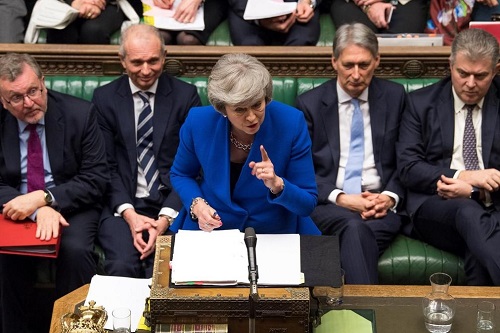Reuters photo
By
Tom Arms
British Prime Minister Theresa May’s Brexit deal is dead. It is just not buried.
The Prime Minister hopes to raise it Lazarus-like and present herself as a political Messiah. But her deal has been shot, knifed, strangled, knocked over the head with the candlestick and thrown into a ditch.
To put the chances of a political miracle into perspective, let us look at the next worse defeat in modern British political history. The current British government lost by 230 votes. The next nearest defeat was in 1924. Ramsay MacDonald’s Labour government had dropped a prosecution against John Ross Campbell, editor of the communist newspaper “The Workers’ Weekly” after he published an article calling on the British armed forces to mutiny in support of a socialist revolution. In that case the majority against the government was a mere 160.
Theresa May likes to portray herself as a strong and stable leader with a Churchillian touch of the British bulldog. A better description would be bull headed.
Parliament has given the Prime Minister until Monday to perform her miracle and come up with a Plan B. She has responded by calling a meeting of all party leaders that will dispense with red lines and reach a compromise, breathe new life into the EU Withdrawal Bill and win over 230 dissenting members of parliament. If this miracle were to happen the result would be a horribly stitched Frankenstein monster.
The biggest problem is not so much the terms of the agreement as the bitter divide between the ruling Conservatives and the Opposition Labour Party of Jeremy Corbyn. The Conservative government is being driven by its far-right wing and Corbyn is so far on the left of the political spectrum that he is in danger of dropping off. His policies are so extreme that the Conservatives are five points ahead in the opinion polls despite the total Brexit disaster. Corbyn’s only hope of winning power and creating a British workers’ paradise is to allow Theresa May to create a chaotic vacuum into which he can step.
That is why, in spite of losing the vote on the EU Withdrawal Bill by 230 votes, the Conservative Party and Northern Ireland’s Democratic Unionists united against Corbyn’s motion of no confidence in the government. They hate the Brexit deal. They are frightened of the Brexit Deal. They hate and are frightened at the prospect of a Corbyn government even more.
Even if Labour and the Conservatives can surmount their ideological differences for the common good there are other parliamentary differences which need to be overcome. The 2016 referendum was called to resolve the remain/leave split within the Conservative Party. It has only turned the crack into a yawning fissure. Not so well known is a similar division within Labour ranks. It would become painfully apparent should Corbyn succeed in orchestrating and winning a general election.
Theresa May is totally opposed to a second referendum. She argues that membership of the EU is not the only issue at stake. The wider—and more important—issue of British democracy is also threatened. British voters were asked what they wanted: In or out. They voted out. It is the duty of the political class to respect the majority decision of the electorate and implement it.
The problem is that the Prime Minister’s position ignores the political reality that she has failed to implement the mandate of the people. The deal that she has negotiated is unacceptable to their parliamentary representatives who are successfully mirroring divisions within the wider British public. The chaos of no deal is also unacceptable. The only credible alternative is to put the question back to the people in a referendum and to bury Theresa May’s EU Withdrawal Bill.
Tom Arms
I am a journalist, entrepreneur and historian with extensive experience in print, web and broadcast journalism. I started as a diplomatic correspondent, wrote several books (The Falklands Crisis, World Elections On File and the Encyclopedia of the Cold War), and then in 1987 started my own business (Future Events News Service, www.fensinformation.com) which over 25 years established itself as the world and UK media’s diary. Our strapline was: “We set the world’s news agenda.” I sold FENS in December 2012 but retained the exclusive broadcast rights to all of FENS data. To exploit these rights I set up LookAhead TV which produces unique programmes which “Broadcasts Tomorrow Today” so that viewers can “Plan to Participate.” LookAhead has appeared regularly on Vox Africa, Radio Tatras International, The Conversation and Voice of Africa Radio.
In addition to being a syndicated broadcaster and columnist on global affairs, Tom is also available for speaking engagements and can be contacted on Twitter, Linkedin and email: [email protected]



No Comments Yet!
You can be first to comment this post!